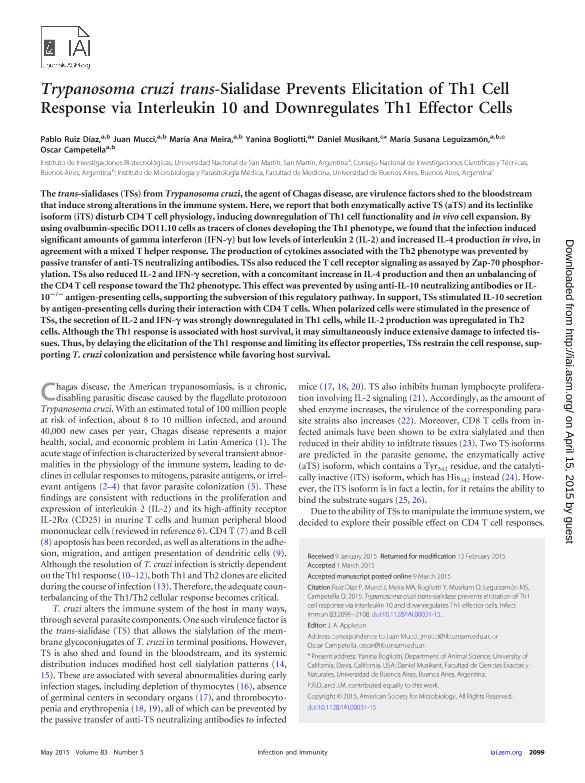Artículo
Trypanosoma cruzi trans-sialidase prevents elicitation of Th1 cell response via interleukin 10 and downregulates Th1 effector cells
Ruiz Díaz, Pablo Daniel ; Mucci, Juan Sebastián
; Mucci, Juan Sebastián ; Meira, María Ana
; Meira, María Ana ; Bogliotti, Yanina; Musikant, Alejandro Daniel; Leguizamon, Maria Susana
; Bogliotti, Yanina; Musikant, Alejandro Daniel; Leguizamon, Maria Susana ; Campetella, Oscar Eduardo
; Campetella, Oscar Eduardo
 ; Mucci, Juan Sebastián
; Mucci, Juan Sebastián ; Meira, María Ana
; Meira, María Ana ; Bogliotti, Yanina; Musikant, Alejandro Daniel; Leguizamon, Maria Susana
; Bogliotti, Yanina; Musikant, Alejandro Daniel; Leguizamon, Maria Susana ; Campetella, Oscar Eduardo
; Campetella, Oscar Eduardo
Fecha de publicación:
05/2015
Editorial:
American Society for Microbiology
Revista:
Infection and Immunity
ISSN:
0019-9567
Idioma:
Inglés
Tipo de recurso:
Artículo publicado
Clasificación temática:
Resumen
The trans-sialidases (TSs) from Trypanosoma cruzi, the agent of Chagas disease, are virulence factors shed to the bloodstream that induce strong alterations in the immune system. Here, we report that both enzymatically active TS (aTS) and its lectinlike isoform (iTS) disturb CD4 T cell physiology, inducing downregulation of Th1 cell functionality and in vivo cell expansion. By using ovalbumin-specific DO11.10 cells as tracers of clones developing the Th1 phenotype, we found that the infection induced significant amounts of gamma interferon (IFN-γ) but low levels of interleukin 2 (IL-2) and increased IL-4 production in vivo, in agreement with a mixed T helper response. The production of cytokines associated with the Th2 phenotype was prevented by passive transfer of anti-TS neutralizing antibodies. TSs also reduced the T cell receptor signaling as assayed by Zap-70 phosphorylation. TSs also reduced IL-2 and IFN-γ secretion, with a concomitant increase in IL-4 production and then an unbalancing of the CD4 T cell response toward the Th2 phenotype. This effect was prevented by using anti-IL-10 neutralizing antibodies or IL-10-/- antigen-presenting cells, supporting the subversion of this regulatory pathway. In support, TSs stimulated IL-10 secretion by antigen-presenting cells during their interaction with CD4 T cells. When polarized cells were stimulated in the presence of TSs, the secretion of IL-2 and IFN-γ was strongly downregulated in Th1 cells, while IL-2 production was upregulated in Th2 cells. Although the Th1 response is associated with host survival, it may simultaneously induce extensive damage to infected tissues. Thus, by delaying the elicitation of the Th1 response and limiting its effector properties, TSs restrain the cell response, supporting T. cruzi colonization and persistence while favoring host survival.
Palabras clave:
Trypanosoma Cruzi
,
Trans-Sialidase
,
Cd4 T Cells
,
Th1/Th2
Archivos asociados
Licencia
Identificadores
Colecciones
Articulos(IIB-INTECH)
Articulos de INST.DE INVEST.BIOTECNOLOGICAS - INSTITUTO TECNOLOGICO CHASCOMUS
Articulos de INST.DE INVEST.BIOTECNOLOGICAS - INSTITUTO TECNOLOGICO CHASCOMUS
Citación
Ruiz Díaz, Pablo Daniel; Mucci, Juan Sebastián; Meira, María Ana; Bogliotti, Yanina; Musikant, Alejandro Daniel; et al.; Trypanosoma cruzi trans-sialidase prevents elicitation of Th1 cell response via interleukin 10 and downregulates Th1 effector cells; American Society for Microbiology; Infection and Immunity; 83; 5; 5-2015; 2099-2108
Compartir
Altmétricas



